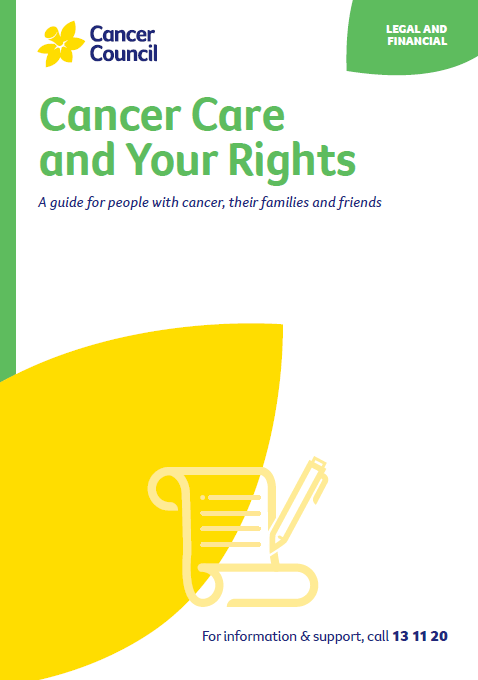- Home
- About Cancer
- Coping with a diagnosis
- Cancer care and your rights
- Making treatment decisions
Making treatment decisions
Whether you have just been diagnosed with cancer or have cancer that has spread or come back, you will have to make a number of decisions about your treatment. It can be difficult to decide on the type of treatment to have. Ask your specialist to explain all the treatment options to you and take as much time as you can before making a decision.
Learn more about:
- Overview
- Decision-making steps
- Getting a second opinion
- Treatment guidelines
- Taking part in a clinical trial
- Giving informed consent
- Advance care planning
Overview
Adults have the right to accept or refuse any treatment they are offered. Some people with advanced cancer choose treatment that has significant side effects even if it gives only a small benefit for a short period of time. Others decide to focus their treatment on quality of life. Becoming informed about your options can help you and your specialist jointly decide on a treatment plan that is right for you.
Understanding the type of cancer you have, the available treatments, possible side effects and any extra costs can help you weigh up the options and make a well-informed decision.
You have the right to delay your decision until you feel you have had enough time to consider all your options. Check with your specialist how soon treatment should begin – it might not affect the success of the treatment to wait a while.
If you are confused or want to check anything, it is important to ask your specialist questions. It’s often a good idea to have a family member or friend go with you to specialist appointments to join in the discussion, write notes, ask questions or simply listen. It may also be possible for them to join the consultation by phone or video call.
Decision-making steps
Each person’s situation is different – not everyone with the same type of cancer will make the same decisions about treatment.
You may find it helpful to do some of the following:
- Weigh up the advantages and disadvantages of each treatment, and whether it will help you meet your treatment goals.
- Take a list of questions to the appointment and ask if you can record the consultation. See a list of suggested questions.
- Ask if other treatments are an option (if only one type of treatment is recommended) or if there are any clinical trials that may be suitable for you.
- Consider how potential side effects might affect you, especially if they will have an impact on your lifestyle, sexuality, fertility, or ability to work; if you have a partner, it may help to discuss any side effects with them.
- Find out more about the treatment choices by: speaking to your specialist or cancer care coordinator; calling Cancer Council 13 11 20; getting a second opinion; contacting cancer support groups; and talking to family, friends or people who have had the same type of cancer.
- Share your concerns with your doctor or the treating hospital, if you’re not happy with the information you are given or how it is given (learn more about feedback and complaints).
- Listen to our podcast on Making treatment decisions below.
→ READ MORE: Getting a second opinion
Podcast: Making Treatment Decisions
Listen to more episodes from our podcast for people affected by cancer
More resources
Prof Sarah Lewis, Faculty of Medicine and Health, The University of Sydney, NSW; Kevin Bloom, Senior Social Worker, Haematology and Bone Marrow Transplant, Royal North Shore Hospital, NSW; Danielle Curnoe, Consumer; Alana Fitzgibbon, Clinical Nurse Consultant – Gastro-Intestinal Cancers, Cancer Services, Royal Hobart Hospital, TAS; Hall & Wilcox (law firm); Johanna Jordaan, Consumer; Dr Deme Karikios, Medical Oncologist, Nepean Cancer and Wellness Centre, Nepean Hospital, NSW; Melissa Lawrie, Breast Cancer Clinical Nurse, Cancer Services, Gold Coast Hospital and Health Service, QLD; Jacqueline Lesage, Consumer Reviewer, Cancer Voices NSW; McCabe Centre for Law and Cancer, VIC; Louise Pellerade, 13 11 20 Consultant, Cancer Council WA; Andrew Potter, Consumer; Siân Slade, PhD Candidate, Nossal Institute for Global Health and Non-Executive Director (health, disability sectors), VIC; Paula Watt, Clinical Psychologist, WOMEN Centre, WA.
View the Cancer Council NSW editorial policy.
View all publications or call 13 11 20 for free printed copies.
Need to talk?
Support services
Need legal and financial assistance?
Pro bono services, financial and legal assistance, and no interest loans
Looking for transport, accommodation or home help?
Practical advice and support during and after treatment
Cancer information
Dealing with the diagnosis
Common reactions to a cancer diagnosis and how to find hope
Cancer, work and you
Learn how cancer and its treatment can affect your work life, and how to manage this

